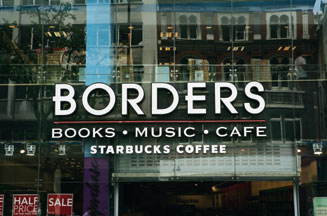
The heavy press coverage of the woes afflicting bookseller Borders will not be making easy reading for its directors.
The company is operating in an unstable market. Traditional bookshops are suffering, eBooks are set to make a breakthrough that could one day see them eclipsing paperbacks, and technology is being developed that lets consumers print titles themselves.
The brand's UK arm has been struggling in this declining book market since it was bought by Luke Johnson, owner of private equity company Risk Capital Partners and chairman of Channel 4, for £20m in 2007. Tough competition from online retailers such as Amazon has added to its troubles.
Doubt was cast on the future of the business at the end of May, when Clearwater Corporate Finance was called in to conduct a potential sale. This month it was announced that Borders had sold several of its premises, including its flagship outlet on London's Oxford Street, to fashion retailer New Look.
However, Borders could still be saved. It is reported to be in advanced talks with retail restructuring services company Hilco over a potential sale of its 46 stores. It is thought Hilco plans to acquire the entire shareholding of Borders UK, saving shops and jobs.
So, has Borders reached its final chapter? We asked Iain Johnston, chief executive at Loewy, and Richard Warren, joint chief executive of ad agency DLKW, for their views. Both have previously worked with retailer WH Smith.
Iain Johnston chief executive, Loewy
I love the idea of Borders. Whenever I walk past the Oxford Street store, the temptation to explore lures me in. However, its tall, narrow format is a nightmare for any retailer trying to encourage browsing.
By the time I've wandered up to the second floor, I know that, yet again, I'm probably not going to buy anything.
There is simply nothing there that I want - HMV is better for music and Waterstone's for literature.
There's no clue as to Borders' raison d'être. Who is it for? What buying occasion does it serve? It acts as a prompt to interest, but in the best teasing tradition, it fails to deliver.
The out-of-town Borders stores can be destinations in their own right, but the high-street ones struggle.
Then there's the Borders website. When the online winners are either aggregators (such as Amazon) or specialists, Borders falls headlong into the generalist trap - a little bit of this and a little bit of that, but none of it done terribly well.
Woolworths should have served as a lesson for retailers - pick ‘n' mix just will not cut it these days.
Remedy
- Get back to basics. Develop a robust brand strategy and jolly well stick to it.
- Review the product mix and how the website is a crucial part of the brand.
- While books are clearly the main source of revenue, the CD and DVD offer appears random and incidental. Give these items a proper reason for being there.
- Look at the online offer and give people a reason to purchase - make it more than just a digital version of the bricks-and-mortar store that lacks the Starbucks and charm.
Richard Warren joint chief executive, DLKW
Borders has no point. Populist fiction, celebrity biographies, celebrity cookbooks and one-offs, such as The Guinness Book of Records, are all sold, on offer, by WH Smith, the supermarkets and, increasingly, Waterstone's.
Online book sales are dominated by Amazon and, increasingly, WH Smith. A smattering of independents survive in towns and parts of cities with a high concentration of bibliophiles. Where is the space for Borders?
In the US, Borders is the place to browse, sit, read from cover to cover, listen to author readings, date, go online, drink coffee and eat sandwiches. What's more, you can read any magazine you want. It's a place devoted to reading. The selling comes from the reading.
There could be a market for this in the UK - a retail homage to reading. My nearest Islington branch is huge, and is full of people browsing. However, all of them are standing. Customers should be given more encouragement to go and sit and read, and drink coffee and eat.
The issue, I am sure, is the rent. Can space be devoted to reading when it could be used for selling? Without such a difference, Borders will remain a retailer in search of a purpose.
Remedy
- Agree the need for a distinct positioning.
- Accept that the brand can't play in the volume market.
- Take a leaf out of HMV's repositioning and seek to become a city-centre flagship ‘experience' brand rooted in reading, browsing and hosting amazing author readings, book clubs and discussions.
- Identify the fastest-growing sectors, such as audio books and eBooks, and let people download books in-store.


.jpg)


.jpg)